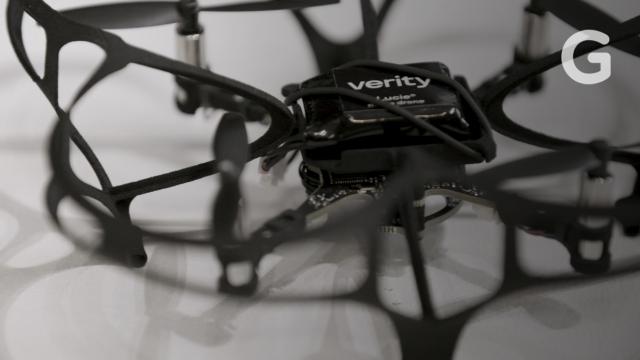Concerts can be boring. Typically, you have an artist on stage singing songs and stuff, and then a bunch of spotlights beaming columns of colour through some fake smoke. But something new is on the horizon, and it’s equal parts creepy and futuristic.
Swarms of artificially intelligent drones are starting to show up on stages around the world. Some, such as the ones on Drake’s latest tour, of are tiny flying lights that float above the stage. Others, such as a recent Cirque du Soleil experience, featured more complex aircraft outfitted with lampshades that produced an almost ghostly effect. Metallica even has its own drone show.
This might sound gimmicky at first, but when you see them live, it’s thrilling to see these little aircraft appear out of nowhere, if only because you can’t figure out how they work
Gizmodo recently sat down with Verity Studios, one of the companies leading the way on entertainment drones, and got a behind the scenes look at the technology.
The company’s founder, Raffaello D’Andrea, actually co-founded Kiva Systems, a company acquired by Amazon in 2012 that now functions as Amazon Robotics. It wasn’t hard to see how Verity Studios’ had some parallels with the autonomous robots that help pick packages in fulfilment centres, too.
A drone show from Verity Studios essentially involves creating an indoor GPS system that each of the custom-built drones uses to find its position. Ahead of a show, the company will install satellites through the arena to create a network that the drones can connect to. Once a drone is on the network, it knows where it is in the space as well as where the other drones are.
The flight paths are pre-choreographed, and the drone operator presses a single button to start the show. The drones are stored in charging trays that get taken to a side stage for takeoff, then fly in formation, illuminated, for about four minutes before dropping out of view.
Safety is obviously a concern. If a single drone fails, it will simply land in place. If a satellite fails, however, the rest of the network will still function.
For now, drone shows such as these happen in indoor venues, and the drones only fly over the stage. In the future, Verity Studios plans to add more drones to the swarm to do more complex choreographies and extend to outdoor venues.
There are also some possible industrial applications for the drones, such as deploying a swarm of them in a warehouse to read sensors on cargo and take inventory.
But even a simple drone show, such as a constellation of flying lights spinning around a rapper, looks pretty incredible. Much better than spotlights, at least.
